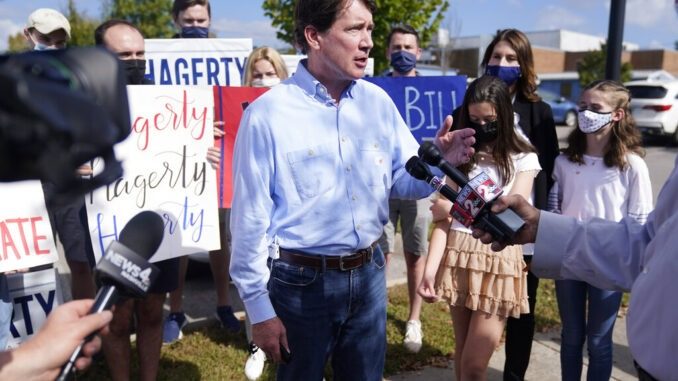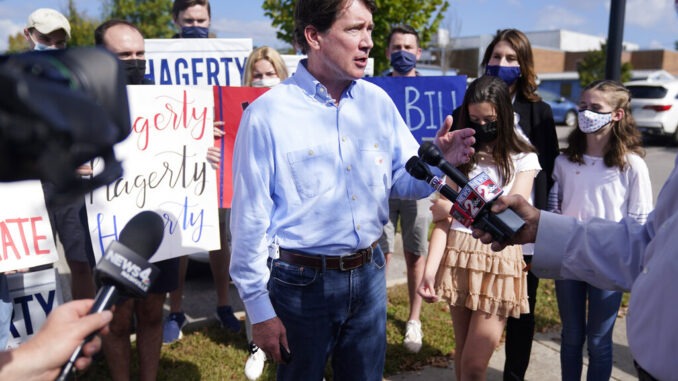

NASHVILLE, Tenn. — Bill Hagerty was vacationing with his family last year in northern Japan, where he was U.S. ambassador to the country, when a friend called and said: “Look at your Twitter account.”
On his favorite forum, President Donald Trump had announced and endorsed Hagerty’s run for an open U.S. Senate seat in Tennessee, before Hagerty declared it himself and months ahead of his campaign launch. If the tweet surprised Hagerty at all though, it was the timing, not the message.
Since then, the successful financier has carved a campaign path in lockstep with Trump to try to succeed retiring GOP Sen. Lamar Alexander. His full embrace of Trump came after working on the failed presidential campaigns of Republicans who later became thorns in Trump’s side — John McCain and Mitt Romney.
“The president knew where my heart was. He and I had been talking about this for some time and he had encouraged me strongly to do it,” Hagerty said in a recent interview.
Hagerty, like many Republicans, hopped from candidate to candidate in the 2016 election cycle before it became clear Trump would become the nominee and his confrontational approach would shape the party. Hagerty had been for Jeb Bush, then Marco Rubio, and ultimately, Trump. In Trump’s view, Hagerty was a commendable early adopter — he joined Trump’s Victory Committee as finance chairman, was a pivotal transition team leader and in 2017, became ambassador to Japan.
The endorsement remains the centerpiece of Hagerty’s run, driving his embrace of the Trump-style politics that at times has turned off some of his previous bosses — McCain, Romney, George H.W. Bush, for whom he served on the President’s Council on Competitiveness; and former Republican Gov. Bill Haslam, who hired Hagerty as his first economic development commissioner.
“The Republican Party has always stood for freedom and opportunity and still does,” Hagerty said. “I just think we are being challenged more and more by the other side. And that results in a starker set of positions that are taken.”
On top of traditional GOP issues like gun rights, opposition to abortion, low tax and regulatory burdens and toughness on illegal immigration, Hagerty has also adopted Trump’s brash tone when talking about Democrats, the Black Lives Matter movement, and others in the president’s crosshairs.
During the first presidential debate, Hagerty tweeted, “The only way the Democrats can win this election is if they cheat, and they know that.”
Hagerty later deemed universal mail voting “far inferior” to Tennessee’s system of requesting absentee ballots.
“I don’t think there’s going to be a transition,” Hagerty said, predicting a Trump win. “I don’t think there’s going to be an issue about this. There are plenty of reasons to be concerned, but I certainly hope that we’ll have clarity on election night, or soon after.”
During a testy Republican primary, he fended off attacks about his business and political ties to Romney, who voted to convict Trump during his impeachment trial, by calling the Utah senator a “weak-kneed” Republican. He said he hasn’t talked to Romney since.
“I intend to work effectively alongside all the senators in Washington, the other 99 of them, both Republican and Democrat, to find ways to serve Tennessee’s interests and work collaboratively with everybody in that institution, including Sen. Romney,” Hagerty said.
He now is pitted against Democrat Marquita Bradshaw, a Black environmental activist who won her party’s nomination in an upset. Hagerty has spent $13.8 million through mid-October, including $4 million to repay part of a loan, as compared to only about $421,800 by Bradshaw, almost all of that during the general election push.
There won’t be a debate in the election, and Bradshaw herself initially said she didn’t want one before reversing course. Bradshaw has embraced progressive wing policies including the Green New Deal and Medicare for all, and has drawn Sen. Bernie Sanders’ endorsement.
“I don’t even know what there is to debate,” Hagerty said. “The differences are so stark.”
Hagerty and the state GOP have shown no concern of a potential upset in Tennessee: Republicans have held both Senate seats since 1994, and Trump’s polling numbers still track strongly in the red state.
Hagerty would be heading to Washington on one of the most pro-Trump-focused campaigns of the cycle. But if Trump loses his re-election, Hagerty would be among many Republicans left to figure out what if anything needs to change in their approach. His record of GOP alliances across the political spectrum, though hardly a focus in his Trump-centric campaign, could be an asset in sorting out the fallout.
“I think the message and the presentation of his campaign has surprised some of us who have known him for a long time, in its tone and its extreme,” said longtime Tennessee Republican strategist Tom Ingram, who worked on Gov. Haslam’s transition team alongside Hagerty. “And so, it’s plausible to think that in a different political environment you might present differently.”



